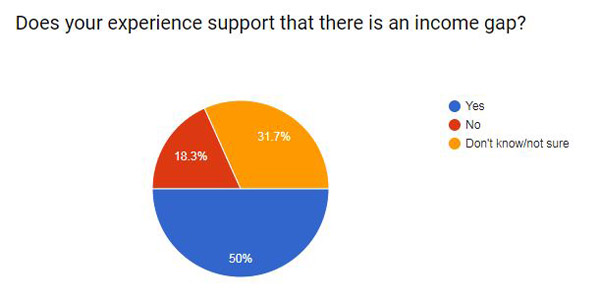At least half of the respondents to a recent Women In Optometry (WO) Pop-up Poll stated that they had experienced an income gap at some point throughout their career. Nearly 32 percent said that they weren’t sure or didn’t know, and just 18 percent said that they had not seen an income gap in their experiences. Eighty-two percent of the respondents were women.


The poll poised a question about what factors could contribute to the income gap, citing research from a recent WO and Jobson Optical report. Poll participants were asked to select all of the reasons that applied that they believe an income gap exists. Many stated that women’s incomes don’t progress at the same rate as men because women do not negotiate as well or as much (64 percent) or due to family duties (60 percent). Forty-six percent said that women choose work situations that provide lower salaries (i.e, employed rather than owners), and 44 percent said that employers offer female candidates less. Thirty-six percent stated that women don’t work as many hours, even if the data is all from “full time” ODs.
For those who believed there is an income gap, WO asked who or what can influence that trend. Here are a few of those responses related to how we can bridge the gap or what may impact it.
In my experience, women are more focused on WHERE they choose to practice geographically (which may drastically limit the available choices and subsequently their potential income) vs focusing on WHAT they want to do and looking for the best opportunity, regardless of location, that is most likely to provide higher income and the best opportunities for advancement/equity/ownership.
Women need to stand up for themselves. If you are offered a position which pays less than you know you are worth, speak up!!!
I never ask for enough or I settle for less without argument
I believe even egalitarian places like Sweden still have an income gap. There’s something deeply ingrained in society and individual motivations where women feel that they’ve earned the right to a maternity leave after a long pregnancy and exhausting delivery. Even at young ages, women are pointed towards “family friendly” careers, whereas we don’t feel compelled to remind men of travel stipulations or that they’d miss out on some recitals. What constitutes being an adequate mom is vastly higher than what is required to be a great dad. Expectations on women are higher.
In our mentor group we teach women that negotiating is ok. You can always ask!!
Empowering women, especially younger ODs, to know their worth and not be afraid to walk away
Several respondents shared additional comments with WO.
The factors related to childcare and adult parent care significantly influence how a woman works. Since this may be more equitable (shared) among younger ODs….
In most practice settings, income is entirely determined by productivity, patient throughput, or salesmanship. Large organizations that hire ODs have salary algorithms that ignore gender.
Having a private practice is the ONLY way to have control over the quality of care your patients receive as well as your work life! My mantra: “You can’t have it all (ie: nothing is perfect), but at least you can CHOOSE.” Having the OD degree puts you in the driver’s seat.
For the longest time I assumed salary was equivalent between male and female ODs. Once I found out that wasn’t true, I stepped up my negotiation game to make sure I got a fair offer.
Women are the primary caregivers, by God’s design. This influences the natural tendency of women to care for children and the home. I found this to be truer than I realized after becoming a mother.



